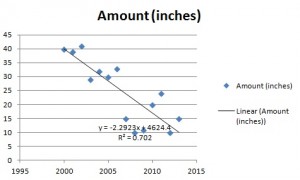
A criterion variable is another name for a dependent variable. However, the terms aren’t exactly interchangeable: a criterion variable is usually only used in non-experimental situations. For example, in statistical modeling applications like multiple regression and canonical correlation which use existing experimental data to make predictions.
Use in Modeling
In statistical modeling, the predictor variable is analogous to an independent variable and is used to predict an outcome (the criterion variable). One of the main differences between independent/dependent and criterion/predictor variables is the concept of causation. You can manipulate independent variables in experimental research and imply that manipulation causes some kind of change in the dependent variable. However, in statistical modeling, correlation doesn’t necessarily mean causation. All the correlation means is that there is some relationship between the two variables. Therefore, a change in the predictor variable may correlate with a change in the criterion variable but it does not mean the change caused anything!
For example, let’s suppose SAT scores are a predictor variable and college GPA is a criterion. You may find through regression analysis that there seems to be a strong correlation between SAT scores and college GPA. However, strong SAT scores do not cause high college GPAs! (more likely it has something to do with a number of factors including hours spent studying, time spent working off-campus, socio-economic status etc. etc.).
If you are conducting experimental research, use the terms independent variable and dependent variable. When you perform further studies on that experimental data (in other words, non-experimental research like correlation), the terms criterion and predictor variables should be used.